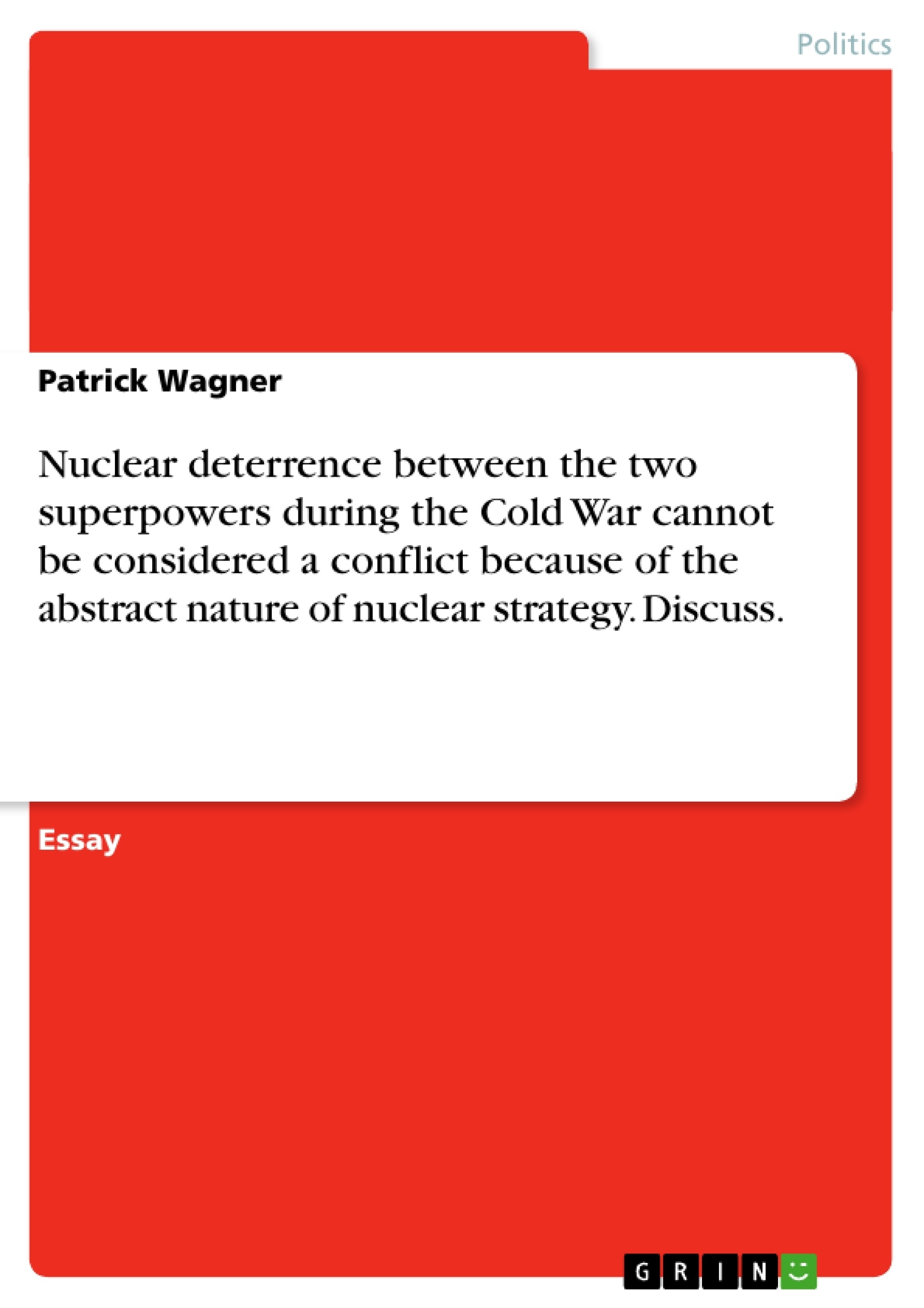When the USA dropped two nuclear bombs on the Japanese cities of Nagasaki and Hiroshima in August 1945, the world witnessed the first and so far the last use of these weapons. Their devastating effect led to a worldwide fear of atomic bombs, but could not, however, prevent a number of states from developing these fatal devices. In fact, the two superpowers engaged in the subsequent arms race during the Cold War, which, in the end, left both with a nuclear arsenal big enough to destroy the entire world several times over.
Although these weapons exist in huge amounts, they have never been used for military purposes since. This distinction is important to make, because the superpowers did make use of their nuclear arsenal on a political level, namely with the strategy of nuclear deterrence. Based on the US assurance that a Soviet attack on the USA or its allies would be answered with massive retaliation, this strategy has prevented a nuclear war.
By looking at the concept of nuclear deterrence in more detail this essay will argue that nuclear deterrence must be seen as a conflict, even though arguments can be found underlining the view that it is not. It is certainly true that the abstract nature of nuclear strategy makes an explanation in the traditional Clausewitzian sense of conflict impossible. However, recognising the fact that the arrival of the nuclear bomb has changed the purpose of military strategy fundamentally, namely from the purpose of winning wars to the purpose of preventing wars , inevitably leads to a new concept of conflict.
Nuclear strategy has introduced a shift of strategic thinking away from the military towards politics. This does of course mean that ‘conflict’ now has to be defined in political terms. ‘Conflict’ can no longer only be seen as the confrontation of armies in the battlefield but must include the threat of use of force, as the political dimension of conflict, as well.
Table of Contents
- Nuclear deterrence between the two superpowers during the Cold War cannot be considered a conflict because of the abstract nature of nuclear strategy. Discuss.
- The concept of deterrence
- Nuclear deterrence in more detail
- The history of nuclear deterrence between the superpowers
- The concept of nuclear deterrence
- The history of nuclear strategy
Objectives and Key Themes
This essay aims to argue that nuclear deterrence during the Cold War should be considered a conflict, despite its abstract nature. It explores the concept of deterrence, both nuclear and non-nuclear, and examines the historical development of nuclear deterrence between the superpowers.
- The nature of conflict in the nuclear age
- The role of deterrence in preventing war
- The complexities of nuclear strategy
- The historical development of nuclear deterrence
- The shift from military to political strategy
Chapter Summaries
- The essay begins by defining the concept of deterrence and providing a brief historical overview of nuclear deterrence between the superpowers. It argues that the arrival of nuclear weapons fundamentally changed the purpose of military strategy from winning wars to preventing them.
- The essay then focuses on the abstract nature of nuclear strategy and the need for a new definition of conflict. It emphasizes the shift in strategic thinking from military to political considerations.
- The essay explores the specific problems of nuclear deterrence, particularly the issue of credibility. It highlights the importance of a second-strike capability and the paradoxical nature of tactical nuclear weapons.
- The essay examines the historical development of nuclear strategy, from the initial focus on nuclear superiority to the adoption of mutually assured destruction (MAD) as a deterrence strategy.
Keywords
The essay explores the concepts of nuclear deterrence, conflict, strategy, Cold War, and mutually assured destruction (MAD). It examines the historical development of nuclear strategy and its implications for international relations.
- Quote paper
- Patrick Wagner (Author), 2003, Nuclear deterrence between the two superpowers during the Cold War cannot be considered a conflict because of the abstract nature of nuclear strategy. Discuss., Munich, GRIN Verlag, https://www.grin.com/document/18955




